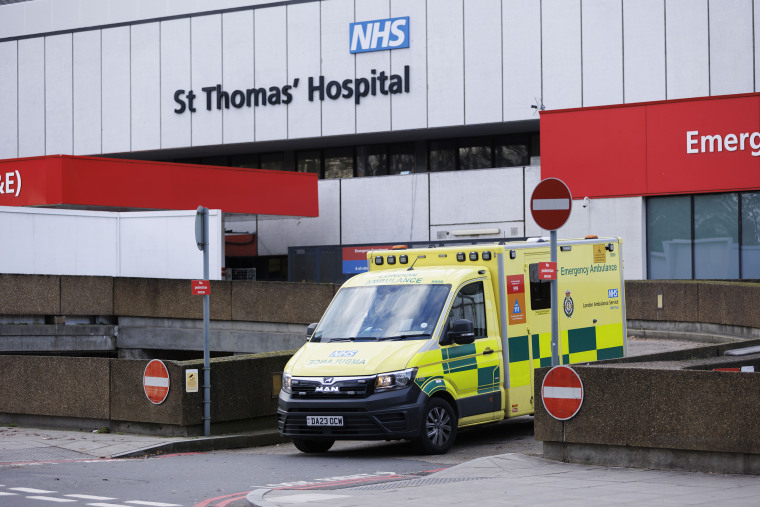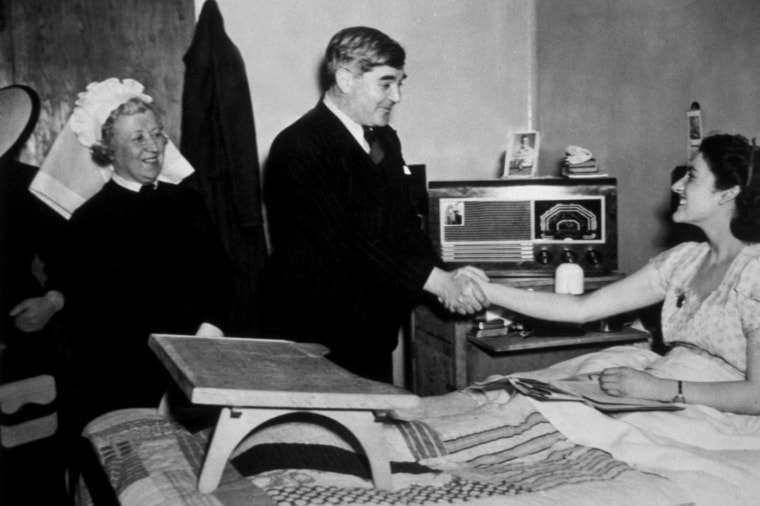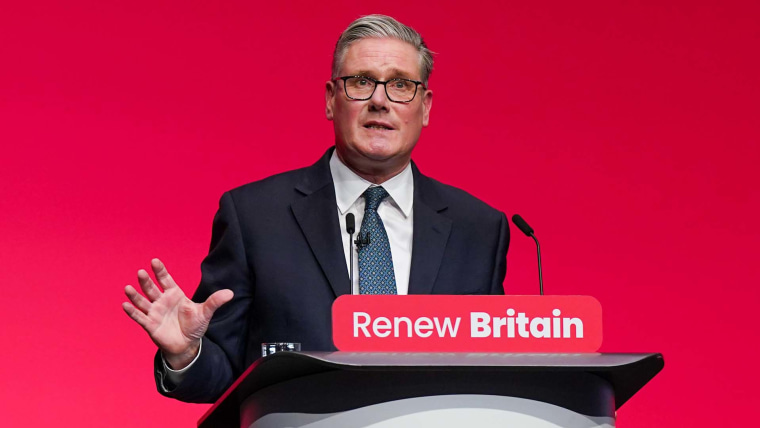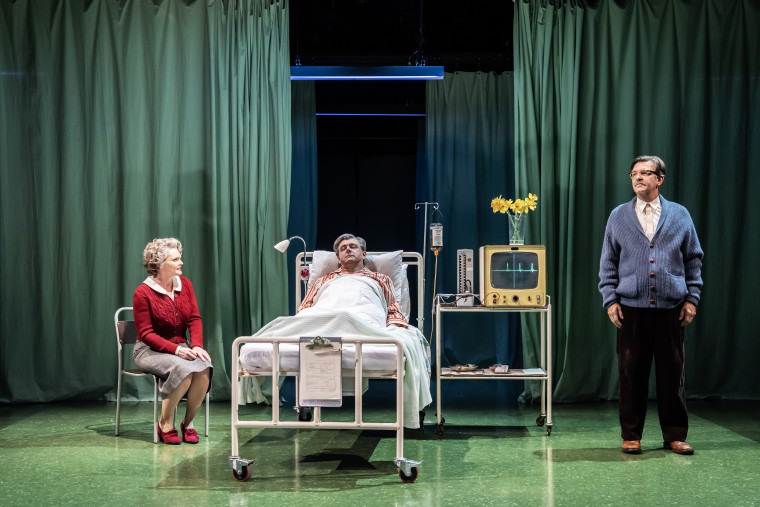The U.K.’s public health service is in crisis, threatening institution at center of British culture

LONDON — Despite being headlined by a genuine star and staged at one of London’s premier theaters, a play about the foundation of a sprawling and troubled public service seemed unlikely to provoke night after night of standing ovations.
But that’s what happened with “Nye,” an unlikely hit about the creator, and origin story, of Britain’s taxpayer-funded National Health Service.
The play, written by Tim Price and directed by Rufus Norris, came at an inflection point for the NHS, as it’s known. Almost 80 years after it was founded, the medical service once touted as the envy of the world is “broken” and suffering the “biggest crisis in its history,” the government says. The crisis at this national bedrock is part of a bigger malaise at the heart of British culture: rising prices, stagnant wages and crumbling public services.
“I’m terrified, not just for the NHS, but for the whole of our society,” Michael Sheen, who starred as Aneurin “Nye” Bevan, the founder of the NHS, told NBC News in an interview. “Once it’s torn down, then I guess people will think about what they’ve lost.”
Sheen, 56, better known to international audiences as Tony Blair in “The Queen,” David Frost in “Frost/Nixon” and the angel Aziraphale in the Amazon Prime series “Good Omens,” has spent much of the last two years honing his portrayal of Bevan, the socialist politician who dragged himself out of Wales’ coal mines to will the NHS into existence.
Though second nature to Brits, the ideal of the NHS is unfamiliar to many Americans: British people have universally free health care at the point of access — from ambulances attending car accidents to insulin for diabetes to cancer care to childbirth. Though some people do have private insurance, the idea of having to choose between illness and financial ruin is shocking in the U.K.
Now the Labour Party, which created the then-radical NHS in 1948, is battling its own economic constraints and record-setting unpopularity. It has a colossal task if it is to fix the crumbling hospitals replete with overworked doctors and bed-lined corridors.
Prime Minister Keir Starmer must turn around a behemoth whose budget of 200 billion English pounds ($269 billion) represents some 40% of all government spending, and whose 1.4 million employees are the world’s seventh-largest workforce. In the United States, only the Department of Defense, Walmart and Amazon outnumber it.

Through all this, the core NHS ideal endures. Everyone in the U.K. has a story of a relative, or themselves, receiving the type of world-class care that puts a terrifying financial strain on millions of Americans. (In the past six years, this reporter’s mother has had a single mastectomy and reconstruction, as well as three titanium plates in a shattered ankle, without having to pay a pound for the care.)
But just as common are the tales of maddening, hourslong waits in overstretched emergency rooms, or weeklong delays just to see a community general practitioner. Many critics blame the sprawling crisis on years of underfunding by the now-ousted Conservative government of 2010-2024, whose response to the 2008 financial crisis was to make drastic cuts to public services.
It’s perhaps unsurprising that a largely liberal London-theatergoing audience responded with applause and tears at the hagiography of Bevan at the National Theater. Though relatively unknown in wider society, admirers see Bevan as a founding father of modern Britain; his ideal of the NHS today is not just popular, it defines the country itself.
“It’s far from perfect,” said Alison Ferris, 40, a nurse at a hospital in Canterbury, in southeast England. “But I do the best that I can for anyone that comes in front of me. I treat every patient like I would treat my loved ones.”
Though the concept remains revered, public satisfaction in the NHS in practice cratered to 52% in 2023 from a high of 70% in 2010, according to the King’s Fund, a top think tank tracking British health care.

“We have to fight for the NHS, the same as the NHS was fought for when it was created,” said Ferris’ mother, Caroline Heggie, 70, a hospital union representative, who like her daughter had come to see the last night of “Nye” at the National Theater last month. “We can’t go the way of privatization, we can’t go the way of America. That’s what we’re up against.”
Like Bevan, Sheen is a Welsh firebrand unafraid to wear his leftist politics. But he also lived for 14 years in Los Angeles, so knows too well what life is like without socialized health care.
“The idea of this health care system that we have here, just seemed so alien to them over there,” Sheen, who now lives back in his Welsh hometown of Port Talbot, says of his former American hosts. He says that “seeing people go into hospitals with serious injuries or illnesses, and being asked to produce their check book before they can be treated” would shock most Britons.
The crisis at the NHS coincides with an uptick in hostility toward immigrants — even though they are often people’s doctors, nurses and hospital cleaners. Almost 20% of NHS staff have a non-British nationality, with Indians, Filipinos, Nigerians, Irish and Poles making up most of their number.
Nigel Farage, the leader of the hard-right Reform U.K. party and an ally and friend of President Donald Trump, is leading some polls to become Britain’s next prime minister. He has become the first prospective leader to question the funding model of using taxes to fund the NHS — historically taboo.

“It doesn’t work — it’s not working,” Farage told NBC News’ British partner Sky News in May. “We’re getting worse bang for the buck than any other country, particularly out of those European neighbours.”
Opposing Farage’s proposal, however, leaves open the specter of privatization, which many say has been creeping up even before the Health and Social Care Act 2012 opened up the NHS to bids from private contractors.
Farage isn’t the only person dissatisfied. Indeed, the NHS has slipped from being a world-leader on many metrics.
“Corridor care” is now a year-round crisis, and the number of people waiting 12 hours or more to be admitted into an emergency room rose from 47 in summer 2015 to 74,150 this summer. Targets have lagged for years in everything from ambulance attendance times to cancer diagnoses. Meanwhile, a 7 million-strong waiting list means many people feel abandoned for months, in pain, before getting hip or knee replacement and other types of surgery.
There is ample evidence to suggest that economic austerity policies imposed during 14 years of Conservative Party rule are at least partly to blame, according to Max Warner, a senior research economist at the Institute for Fiscal Studies, a London research group.
“It is true that a lot of NHS performance measures over the 2010s were broadly getting worse having started off relatively well,” he said. “Although it’s worth saying that productivity did grow, so it’s a nuanced picture and causality is difficult.”
The Conservatives argued that they kept NHS spending up, protecting it from the brutal cuts that crushed almost every other government department at the time. But this 2% yearly growth still fell well short of the 3.8% yearly average since the 1980s, and according to critics was insufficient to cope with an aging population and the rising prices of cutting-edge drugs.
Far from the envy of the world, Britain has been scrimping by spending 37 billion pounds ($53 billion) on the health services each year, well below Germany, France and Australia, a landmark review found last year.
The current Labour government has outlined plans to raise spending to around 3% — an improvement but still short of what many advocates had hoped. At his annual Labour Party conference this week, Starmer announced that a digital overhaul named NHS Online would launch in 2027, describing it as “a new chapter in the story of our NHS.”
Ultimately, whatever the model, cash is key, according to Roy Lilley, who ran an NHS hospital in the 1990s as chairman of Homewood NHS Trust in Surrey, west of London.

“It doesn’t matter how you pay for your health care,” said Lilley, today a consultant whose newsletter hits 300,000 inboxes. “Whether you take it out of your pocket marked ‘insurance,’ or you take it out of your pocket marked ‘taxes,’ it’s still your trousers.”
He remains optimistic, however, pointing to some waiting metrics improving and a general recovery from the hammerblow of the pandemic, which drained resources and mentally scarred doctors.
Still, Sheen — never shy to mix acting with activism — believes it’s no coincidence that the NHS is in crisis just when its origin story begins to vanish from living memory.
“The crisis that we seem to be experiencing makes it all the more important to go back to the beginning and to look at what was behind the founding of the NHS, and what the principles were,” he said. “It becomes incredibly important to tell the story of it and to remind people of what it was actually like, so that we don’t forget.”
[title_words_as_hashtags



